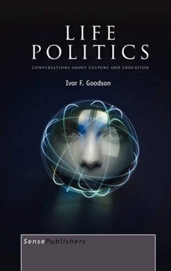Life Politics: conversations about education and culture
Mediation is the Message
QUESTION: What you say leads us to one question - how can we think against the particular thought that dominates a specific moment?
IVOR: I don’t actually think that being an organic intellectual is inevitably subversive of power, and all subversive of domination. I don’t think it’s inevitable I’m not inevitably oppositioned. That’s not my position in the world. My position in the world is: I look at each situation, evaluate it in terms of my own beliefs and concerns for the collectives I’m interested in, and make my judgement. So I’m not always a subversive person, I’m not always subversive of power. Because power is a variable, it’s not inevitably bad, it’s sometimes better that in other times, that’s a historical judgement. So I’m different to those people that see themselves as always oppositioning, always against domination. We know some of those people. I think that’s more to do with their own kind of psychoanalytical conditions. I’m normally interested in domination and I’m normally opposed to much of what comes there, but I will make the judgement according to the historical moment. That’s my point. So it makes all sorts of differences as to whether you believe in just constant opposition, constant resistance. I mean, I tend to come out a lot of the time, but not always. I’ll evaluate each historical moment. Let’s go back and look at the politics in England in the 60’s and then in the 90’s. In the 1960’s, domination, as you call it, was reasonably progressive in its orientation. You had a Labour government, much influenced by a lot of progressive forces in the society, you had a very affluent kind of economy. Profits were being made anyhow. There was enough money to build up schools, to pay an inclusive pedagogy, to actually develop a whole kind of set of very interesting social experiments. At that time, I was not opposed to domination, I was working with the general kind of liberal force of that domination. At other times I would be opposed, but in that moment the two were in reasonable harmony for me to create the kind of pre-figurative politics I talked about. So I think it’s a very interesting question, as whether one is inevitably subversive in a position as an intellectual. My own instinct to it is no. I take, I evaluate. This is the link between analysis and action. For me the two things are the same actually, which is you look into a situation, you try and read the situation and the trajectories as best as you can with the things you have in mind in terms of action, you make a series of judgements and then you take action. There was a man called (Stanley/ Stan Lee) in England who set up a commune, under (...’s) times. And fought like hell for this piece of land for all the people. In the end they killed all the people and put him in prison. The last thing he said was “I thought, I acted, I am at peace”. And that’s kind of the way I feel, you know, you think it through, you act as best as you can, and that’s your contribution. But it’s not inevitably always fighting, it’s not always opposition. There’s this belief though that annoys me about certain aspects of life in politics, that you always have to be fighting, that you always have to be on the barricade, you always have to be oppositioned. It isn’t true. I mean sometimes yes, sometimes no. Of course power tends to be of a particular sort, but sometimes it’s more benign. Sometimes you can work better with it than at other times. Sometimes I would be very oppositional, and other times I’d be less though. I don’t see it as a kind of psychological need to always be contesting power at every point. I mean, you know the history of Argentina, there’s been power that you could work with, and power that you would oppose with everything you’ve had, you’d leave the country, you’d go away, you’d fight it in any way you could. But at other times, you know, in 1916 maybe power was ok, 1928 to 1940, you could work there. Power is not monolithic any more than anything else is. It doesn’t always work badly. Sometimes it moderates, and you can work with a moderate (...).
